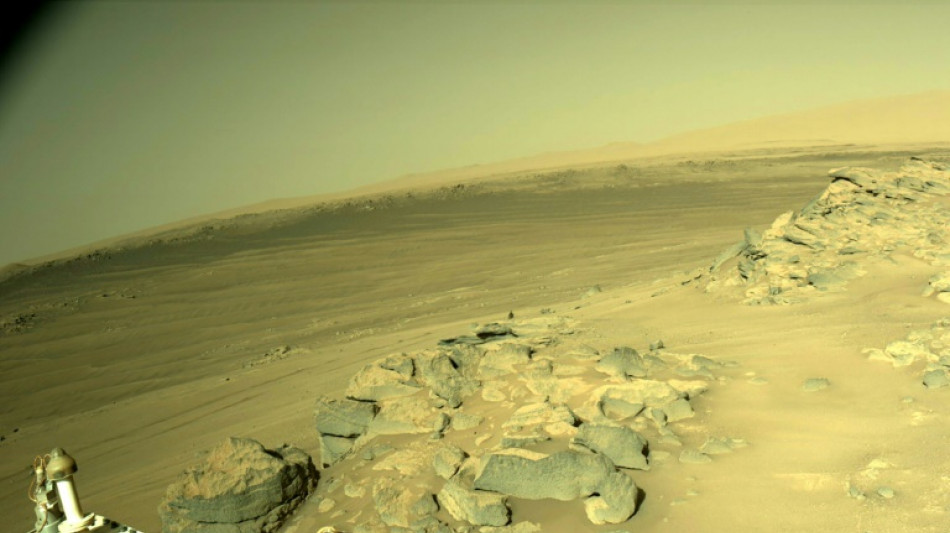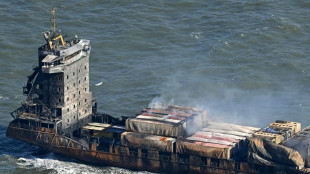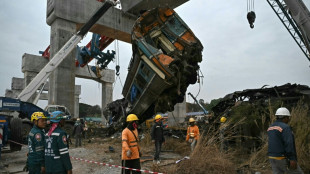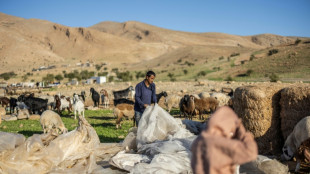
-
 European basketball pioneer Schrempf lauds 'global' NBA
European basketball pioneer Schrempf lauds 'global' NBA
-
Denmark, Greenland in crunch White House talks as Trump ups pressure

-
 Mitchell hits ton as New Zealand down India to level ODI series
Mitchell hits ton as New Zealand down India to level ODI series
-
Syrian army tells civilians to stay away from Kurdish positions east of Aleppo

-
 Spurs sign England midfielder Gallagher from Atletico Madrid
Spurs sign England midfielder Gallagher from Atletico Madrid
-
Russian captain tried to avoid North Sea crash: court

-
 Battle over Chinese-owned chipmaker Nexperia rages in Dutch court
Battle over Chinese-owned chipmaker Nexperia rages in Dutch court
-
Transatlantic ties 'disintegrating': German vice chancellor

-
 Five problems facing Ukraine's new defence chief
Five problems facing Ukraine's new defence chief
-
Italian influencer Ferragni acquitted in Christmas cake fraud trial

-
 UK interior minister says 'lost confidence' in police chief over Maccabi fan ban
UK interior minister says 'lost confidence' in police chief over Maccabi fan ban
-
Ryanair hits out at 'stupid' Belgium over aviation taxes

-
 Burkina Faso sack coach Traore after AFCON exit
Burkina Faso sack coach Traore after AFCON exit
-
African manufacturers welcome US trade deal, call to finalise it

-
 What happens when fire ignites in space? 'A ball of flame'
What happens when fire ignites in space? 'A ball of flame'
-
Death of author's baby son puts Nigerian healthcare in spotlight

-
 France bans 10 British anti-migrant activists
France bans 10 British anti-migrant activists
-
2025 was third hottest year on record: climate monitors

-
 Hydrogen planes 'more for the 22nd century': France's Safran
Hydrogen planes 'more for the 22nd century': France's Safran
-
Julio Iglesias, the Spanish crooner who won global audience

-
 'We can't make ends meet': civil servants protest in Ankara
'We can't make ends meet': civil servants protest in Ankara
-
UK prosecutors appeal Kneecap rapper terror charge dismissal

-
 UK police chief blames AI for error in evidence over Maccabi fan ban
UK police chief blames AI for error in evidence over Maccabi fan ban
-
Oil prices extend gains on Iran unrest

-
 France bans 10 UK far-right activists over anti-migrant actions
France bans 10 UK far-right activists over anti-migrant actions
-
Every cent you take: Sting, ex-Police band mates in royalty battle

-
 Thailand crane collapses onto train, killing 32
Thailand crane collapses onto train, killing 32
-
Amateur stuns star-studded field to win 'One Point Slam' in Melbourne

-
 Italian influencer Ferragni awaits verdict in Christmas cake fraud trial
Italian influencer Ferragni awaits verdict in Christmas cake fraud trial
-
Louvre and other French museums fare hikes for non-European visitors

-
 Japan's Takaichi to dissolve parliament for snap election
Japan's Takaichi to dissolve parliament for snap election
-
Dutch court hears battle over Nexperia

-
 World-first ice archive to guard secrets of melting glaciers
World-first ice archive to guard secrets of melting glaciers
-
Ted Huffman, the New Yorker aiming to update top French opera festival

-
 Ofner celebrates early then loses in Australian Open qualifying
Ofner celebrates early then loses in Australian Open qualifying
-
Singer Julio Iglesias accused of 'human trafficking' by former staff

-
 Luxury retailer Saks Global files for bankruptcy
Luxury retailer Saks Global files for bankruptcy
-
Asian markets mostly up with politics bump for Tokyo

-
 Iran vows fast trials over protests after Trump threat
Iran vows fast trials over protests after Trump threat
-
China's trade surplus hit record $1.2 trillion in 2025

-
 Trail goes cold in UK abandoned babies mystery
Trail goes cold in UK abandoned babies mystery
-
Japan's Takaichi set to call February snap election: media

-
 Scientist wins 'Environment Nobel' for shedding light on hidden fungal networks
Scientist wins 'Environment Nobel' for shedding light on hidden fungal networks
-
From bricklayer to record-breaker: Brentford's Thiago eyes World Cup berth

-
 Keys overcomes serve demons to win latest Australian Open warm-up
Keys overcomes serve demons to win latest Australian Open warm-up
-
As world burns, India's Amitav Ghosh writes for the future

-
 Actor Kiefer Sutherland arrested for assaulting ride-share driver
Actor Kiefer Sutherland arrested for assaulting ride-share driver
-
Gilgeous-Alexander shines as Thunder halt Spurs losing streak

-
 West Bank Bedouin community driven out by Israeli settler violence
West Bank Bedouin community driven out by Israeli settler violence
-
Asian markets mixed, Tokyo up on election speculation


Sound of a dust devil on Mars recorded for first time
The sound of a dust devil on Mars was recorded for the first time as the eye of the whirlwind swept over the top of NASA's Perseverance rover, a new study said Tuesday.
"We hit the jackpot" when the rover's microphone picked up the noise made by the dust devil overhead, the study's lead author Naomi Murdoch told AFP.
The researchers hope the recording will help to better understand the weather and climate on Mars, including how its arid surface and thin atmosphere may once have supported life.
Common across Mars, dust devils are short-lived whirlwinds loaded with dust that form when there is a major difference between ground and air temperatures.
They are a common feature in the Jezero crater, where the Perseverance rover has been operational since February 2021 -- but it had never before managed to record audio of one of them.
By chance on September 27, 2021, a dust devil 118 metres (390 feet) high and 25 metres wide passed directly over the rover.
This time the microphone on the rover's SuperCam -- which previously recorded the first ever audio from the Martian surface -- managed to catch the muffled, whirring sounds of the dust devil.
"We hear the wind associated with the dust devil, the moment it arrives, then nothing because we are in the eye of the vortex," said Murdoch, a planetary researcher at France's ISAE-SUPAERO space research institute, where the SuperCam's microphone was designed.
Then the sound returns "when the microphone passes through the second wall" of the dust devil, she added.
- A dust devil mystery -
The impact of the dust made "tac tac tac" sounds which will let researchers count the number of particles to study the whirlwind's structure and behaviour, she said.
It could also help solve a mystery that has puzzled scientists. On some parts of Mars, "whirlwinds pass by sucking up dust, cleaning the solar panels of rovers along the way," Murdoch said.
But in other areas, the whirlwinds move by without kicking up much dust. "They're just moving air," Murdoch said, adding that "we don't know why".
For example, the solar panels of NASA's InSight lander are "covered in dust" because it is located at a spot where it cannot take advantage of these natural vacuum cleaners, she said.
Understanding why this happens could help scientists build a model of dust devils so they might predict where the whirlwinds might strike next.
It could even shed light on the great dust storms that sweep across the planet, famously depicted in the 2015 science-fiction film "The Martian", starring Matt Damon. However Murdoch noted that the violence of the dust storms shown in the film was "unrealistic".
Sylvestre Maurice, a planetary scientist and co-author of the study published in the journal Nature Communications, said that analysing Martian dust makes it possible to "explore the interactions" between the ground and the extremely thin atmosphere.
The atmosphere was much thicker billions of years ago, which allowed for the presence of life-sustaining liquid water, said Maurice, who also works on the SuperCam.
"You might think that studying the Martian climate today is unrelated to the search for traces of life from billions of years ago," he said.
"But it is all part of a whole, because the history of Mars is one of extreme climate change from a humid, hot planet to a completely arid and cold planet."
M.Qasim--SF-PST


